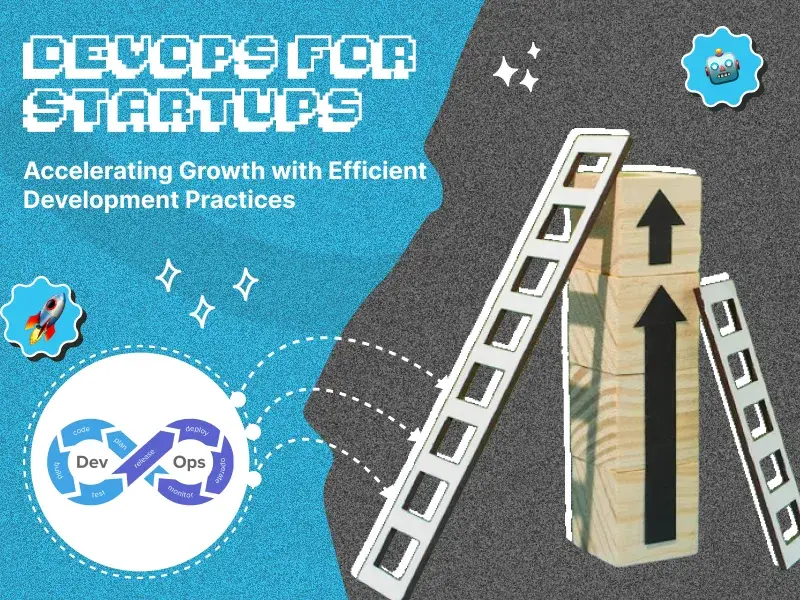Introduction
As the startup ecosystem grows ever more competitive, the need for speed, efficiency, and innovation becomes paramount. At Creole Studios, we understand this challenge. That’s why we’re passionate about empowering startups with the tools and expertise they need to thrive.
DevOps, an approach combining software development (Dev) and IT operations (Ops), emerges as a powerful strategy for startups to achieve this. By hiring DevOps engineers, startups can harness specialized skills and knowledge essential for streamlining operations and accelerating growth.
This guide will equip you with the knowledge and insights to leverage DevOps and unlock its potential for accelerating your startup’s growth. Whether you’re just starting with DevOps or looking to optimize your existing practices, this guide is your one-stop resource.
What is DevOps?
DevOps is a modern software development approach that emphasizes collaboration between developers and operations teams. Traditionally, these two teams worked in silos, leading to inefficiencies and communication gaps. DevOps bridges this gap by fostering a culture of collaboration and shared responsibility, enabling faster software delivery and improved reliability.
By integrating tools, practices, and cultural philosophies, DevOps aims to automate repetitive tasks, enhance communication, and streamline the development lifecycle. This ultimately results in quicker release cycles, better software quality, and more efficient development processes.
Challenges Faced by Startups not leveraging DevOps
Startups face a unique set of challenges in today’s fast-paced and competitive environment. Here are some of the most common hurdles they encounter:
- Slow Development Cycles: Traditional development approaches can be slow and cumbersome with separate Dev and Ops teams. Communication gaps and delays in collaboration create bottlenecks, hindering the software development process. This can lead to missed deadlines and a struggle to keep up with the rapid pace of innovation.
- Limited Scalability: As a startup grows, its user base also increases. Manually provisioning and managing servers to meet these growing demands can be a slow and inefficient process. The inability to scale infrastructure quickly enough can stifle growth and frustrate users.
- Security Vulnerabilities: Security often takes a backseat in traditional development, leaving startups vulnerable to cyberattacks. These breaches can damage user trust and reputation, potentially causing significant financial losses.
- Lack of Communication and Collaboration: Disjointed teams with different priorities can lead to misunderstandings and misalignment. Communication gaps between developers and operations can hinder overall efficiency and slow down problem-solving.
These challenges can significantly impede a startup’s ability to thrive. However, there’s a solution…
DevOps – How It Solves Startup Problems
DevOps offers a powerful approach that can help startups overcome these challenges and accelerate their growth. Here’s how:
- Faster Releases with Automation: DevOps promotes automation and continuous integration/delivery (CI/CD). By automating repetitive tasks and integrating code changes and tests continuously, DevOps allows startups to release new features and bug fixes faster. This agility gives them a competitive edge by enabling them to quickly respond to market demands and user feedback.
- Effortless Scaling with Infrastructure as Code (IaC): Infrastructure as code (IaC) allows startups to automate infrastructure provisioning and management. This means they can quickly scale their resources up or down as needed to meet user demands. IaC eliminates the need for manual server configuration, saving valuable time and resources.
- Proactive Security Integration: DevOps integrates security practices throughout the development lifecycle. This proactive approach helps identify and address vulnerabilities early on, reducing the risk of security breaches. By prioritizing security from the beginning, startups can build trust with users and protect their valuable data.
- Fostering a Collaborative Culture: DevOps fosters a culture of collaboration and shared responsibility between development and operations teams. This breaks down silos and promotes better communication, leading to a more efficient development process. By working together, teams can identify and solve problems more quickly, ultimately accelerating development and innovation.
By embracing DevOps practices, startups can overcome these hurdles and achieve faster development cycles, improved scalability, enhanced security, and better collaboration.
Read More: DevOps Engineer vs Software Engineer
How Startups can start leveraging DevOps? The 7 C’s of Devops lifecycle explained
Startups, with their fast-paced environments and focus on rapid iteration, can benefit greatly from adopting DevOps practices. Here are some key practices that are particularly well-suited for startups, along with the corresponding phase of the 7 Cs of DevOps lifecycle they address:
| DevOps Practice | Benefit for Startups | 7 Cs of DevOps lifecycle |
| Focus on Collaboration and Communication | Breaks down silos: Developers and operations teams work together, eliminating communication gaps and delays. Improves problem-solving: Shared knowledge leads to faster identification and resolution of issues. Increases efficiency: Teams work as a unit, streamlining development and deployment processes. | Continuous Collaboration |
| Automate Early and Often | Frees up developer time: Tedious tasks are automated, allowing developers to focus on innovation and core functionalities. Reduces errors: Manual processes are prone to mistakes, automation minimizes errors and ensures consistency. Increases development speed: Faster automation of tasks leads to quicker turnaround times for new features and bug fixes. | Continuous Integration & Continuous Delivery (CI/CD) |
| Embrace Continuous Integration and Delivery (CI/CD) | Faster feedback loops: Code changes are automatically integrated and tested, providing developers with quicker feedback. Reduces release risks: Automated testing helps identify bugs early on, preventing issues in production. More frequent deployments: Streamlined CI/CD pipeline allows for more frequent releases of new features and updates. | Continuous Integration & Continuous Delivery (CI/CD) |
| Start with Simple Infrastructure as Code (IaC) | Reduces infrastructure management time: Scripting automates infrastructure provisioning and configuration, saving valuable time. Improves consistency: IaC ensures repeatable deployments across environments, reducing errors and inconsistencies. Scales with your business: Simple IaC can be easily expanded upon as your startup grows. | Continuous Infrastructure (Infrastructure as Code) |
| Prioritize Security | Reduces vulnerability risk: Integrating security practices early on prevents vulnerabilities from being introduced later. Protects user data: Secure CI/CD pipelines and IaC configurations safeguard sensitive information. Builds trust with users: A focus on security fosters user confidence in your application. | Continuous Security |
| Monitor for Performance and Errors | Identifies issues quickly: Proactive monitoring helps detect problems before they impact users. Improves uptime and performance: Issues can be addressed promptly, minimizing downtime and ensuring smooth operation. Provides data for improvement: Monitoring data helps identify areas for optimization and resource allocation. | Continuous Monitoring |
| Embrace a Learning Culture | Adapts to change: The ability to learn and adapt allows startups to keep pace with evolving technologies and best practices. Improves problem-solving: By learning from mistakes, teams become better equipped to handle future challenges. Empowers teams: A learning culture fosters ownership and encourages continuous improvement. | Continuous Learning |
Remember, startups should prioritize implementing these practices in a way that is lightweight, efficient, and scales alongside their business. Focus on the core concepts and adapt them to your specific needs and resources.
Read More: Key Skills for a Successful DevOps Engineer
Essential DevOps Tools for Efficient Development
Automation Tools
Automation is a cornerstone of DevOps Engineer, and several tools stand out:
- Ansible: It automates tedious tasks like setting up new servers, configuring software, and deploying applications. This frees up your team to focus on what they do best – building amazing features!
- Jenkins: It automates the entire software development pipeline, from taking your code and building it into a working application, to rigorously testing it for any bugs before it reaches users. This ensures a smooth and reliable development process.
- Docker: Imagine packing all your app’s tools and libraries into a single box. That’s what Docker does! This makes it easy to deploy your app consistently across different environments, whether it’s your development machine or a server running in the cloud.
Infrastructure as Code (IaC)
Traditionally, setting up servers involved complex configurations. IaC tools like Terraform change the game. Think of it as writing clear instructions for building your infrastructure (servers, databases, etc.) from scratch. This ensures everything is set up consistently and avoids any manual errors, saving you time and frustration.
Monitoring and Security Tools
- Tools like Prometheus and Grafana are like having a health monitor for your applications. They track your app’s performance in real-time, so you can identify any issues before they impact your users. It’s like having a constant pulse check on your app’s health!
- Building secure software is crucial. DevOps Engineer emphasizes integrating security practices throughout the development process. This means making sure your code and infrastructure are protected from potential threats right from the start.
Top 3 Challenges in DevOps Implementation & Solutions
Building a great startup is tough. You need to move fast, stay lean, and deliver awesome features to your users. But traditional development can be slow and clunky. That’s where the DevOps Engineer comes in to be your superhero!
- Challenge: Limited Expertise
- Solution: Team Up with the DevOps Avengers! Accessing a global talent pool ensures startups can find experts with specialized skills, enhancing the efficiency and effectiveness of their DevOps practices.
- Challenge: How Do We Keep Learning and Improving?
- Solution: Become a DevOps Mastermind! DevOps is all about getting better every day. Encourage your team to be curious and learn from each other. Look for ways to improve your processes and embrace new tools. Staying up-to-date keeps your startup agile and innovative.
- Challenge: Security vs. Speed? Can’t We Have Both?
- Solution: Build a Secure Dev Stream! Security is critical, but it shouldn’t slow you down. DevOps Engineer allows you to bake security right into your development process. Imagine a system automatically checking for weaknesses and keeping your code and infrastructure safe. This lets you launch products quickly without compromising user trust.
The ROI of DevOps: Increased Speed, Reduced Costs
How can you quantify the exact value of a DevOps Engineer? A white paper by Google Cloud, The ROI of DevOps Transformation, explores this question in detail. The paper highlights the concept of a “value-driven approach” to measuring DevOps Engineer ROI. This approach focuses on the benefits of faster software delivery and increased development speed, such as:
- Reduced rework costs: By catching bugs earlier in the development process, you can avoid the time and expense of fixing them later.
- Increased value from new features: By getting new features to customers faster, you can start generating revenue sooner and improve customer satisfaction.
The paper also provides industry benchmarks for rework rates based on IT performance categories (Elite, High, Medium, and Low). These benchmarks can help you estimate the potential value you can gain from reduced rework for your startup
Devops Cost Management Strategies:
- Leverage Open-Source Tools: A vast ecosystem of powerful open-source DevOps tools is available, including Ansible for automation, Jenkins for continuous integration/delivery (CI/CD), and Prometheus for monitoring. These tools offer a cost-effective way to get started with DevOps practices.
- Phased Implementation: Start small and prioritize the areas with the highest impact. Begin by automating routine tasks and gradually integrate more complex DevOps practices as your team gains experience and budget allows.
- Embrace the Cloud: Cloud platforms offer pay-as-you-go models for infrastructure and services. This eliminates upfront costs for hardware and allows you to scale resources dynamically based on your needs, reducing long-term expenses.
- Focus on ROI: While there will be initial investments, remember that DevOps can lead to significant cost savings in the long run. Focus on measuring the return on investment (ROI) by tracking metrics like reduced development time, fewer errors, and faster deployments. Use this data to justify further DevOps investments.
- Consider a Hybrid Approach: Don’t feel pressured to adopt a complete DevOps overhaul at once. A hybrid approach that combines open-source tools, phased implementation, and selective use of cloud services can be a cost-effective way to gain the benefits of DevOps without breaking the bank.
- Open Source Communities: Many open-source DevOps tools have vibrant online communities. Utilize these communities for support, troubleshooting, and learning best practices, potentially reducing reliance on paid consulting services.
Outsourcing DevOps Engineer operations can offer significant advantages, especially for startups with tight budgets and limited expertise. This approach allows startups to hire DevOps engineers who possess the necessary skills without the need for extensive in-house training and hiring.
Additional Tips:
- Start with a Proof of Concept (POC): Before a full-scale implementation, conduct a proof of concept (POC) with a small project to identify potential challenges and assess the value proposition for your specific needs.
- Invest in Training: While initial training costs might seem high, a skilled team can optimize DevOps Engineer practices and ensure a smooth implementation, leading to long-term cost savings.
By adopting these cost management strategies, startups can effectively leverage DevOps practices without straining their budgets.
Real-Life Examples of Successful DevOps Implementations
- Retail: Walmart
In the fast-paced retail world, customer trends and demands shift rapidly. Traditional development processes can be slow and rigid, making it difficult for retailers to adapt quickly.
Walmart uses DevOps Engineer to automate application deployment. This means new features and updates can be rolled out quickly and efficiently, allowing them to capitalize on emerging trends and keep their offerings fresh for customers. Additionally, by leveraging open-source tools, they streamline development while controlling costs
Benefit: Walmart’s embrace of DevOps Engineer allows them to be more agile and responsive to customer needs. This translates to a more competitive edge and a better overall shopping experience.
- Entertainment: Netflix
In the competitive world of streaming services, user engagement is paramount. If updates and new features are slow to roll out, users might lose interest and switch to competitors.
Netflix is renowned for its robust DevOps practices. They heavily rely on automation for tasks like building, testing, and deploying new features. This allows them to release updates and features continuously, ensuring users always have something fresh to explore. Furthermore, continuous delivery practices ensure a smooth viewing experience by minimizing bugs and glitches.
Benefit: By constantly innovating and delivering new content, Netflix keeps its users engaged and satisfied. This translates to a loyal customer base and a dominant position in the streaming market.
- Financial Services: Capital One
For online banking platforms, reliability and speed are critical. Customers expect seamless and fast access to their accounts, and any downtime or slow performance can damage trust. Additionally, traditional infrastructure management can be cumbersome and slow to scale, hindering growth.
Capital One embraced DevOps Engineer to improve the efficiency and reliability of its online banking platform. Automation plays a key role, in streamlining tasks like infrastructure provisioning and configuration management. This allows them to quickly scale their systems up or down as needed to meet fluctuations in customer demand.
Benefit: By leveraging DevOps, Capital One ensures their online banking platform is reliable, fast, and can handle surges in traffic. This translates to a positive customer experience and fosters trust in their services.
- Manufacturing: GE Aviation
In the aviation industry, even minor inefficiencies in jet engine performance can have a significant impact on fuel consumption and maintenance costs. Additionally, any downtime due to software issues can disrupt airline operations and passenger schedules.
GE Aviation utilizes DevOps principles to streamline the development and deployment of software for their jet engines. This allows them to identify and address performance issues quickly, leading to optimized engine performance and reduced fuel consumption. Furthermore, by automating testing and deployment processes, they minimize the risk of software glitches that could cause downtime.
Benefit: Through DevOps practices, GE Aviation ensures their jet engines operate at peak efficiency, reducing costs for airlines. Additionally, minimized downtime translates to smoother operations and a better flying experience for passengers.
These examples showcase the versatility of DevOps engineers across different industries. By automating processes, streamlining development, and fostering collaboration, companies are overcoming significant challenges and achieving remarkable results. Whether your startup operates in retail, entertainment, finance, or manufacturing, DevOps Engineer can be the key to unlocking your full potential.
Conclusion
Adopting DevOps practices allows startups to achieve efficiency, agility, and innovation in a highly competitive market. By fostering collaboration, automating processes, and integrating continuous feedback, startups can quickly deliver high-quality products and services. Whether outsourcing or building a strong in-house team, embracing DevOps paves the way for accelerated growth and sustained success.
Ready to take your startup to the next level? Embrace DevOps Engineer and watch your development process optimize!
At Creole Studios, we’re passionate about empowering startups with the tools and expertise they need to thrive. We offer a comprehensive suite of DevOps services, from strategy and implementation to ongoing support. Our team of experienced DevOps engineers can help you streamline your development process, improve your time to market, and achieve your business goals.
Contact Creole Studios today for a free consultation and learn how we can help you unlock the full potential of DevOps for your startup!











 30 mins free Consulting
30 mins free Consulting 
 10 min read
10 min read 


 Canada
Canada 
 USA
USA 






 Love we get from the world
Love we get from the world 